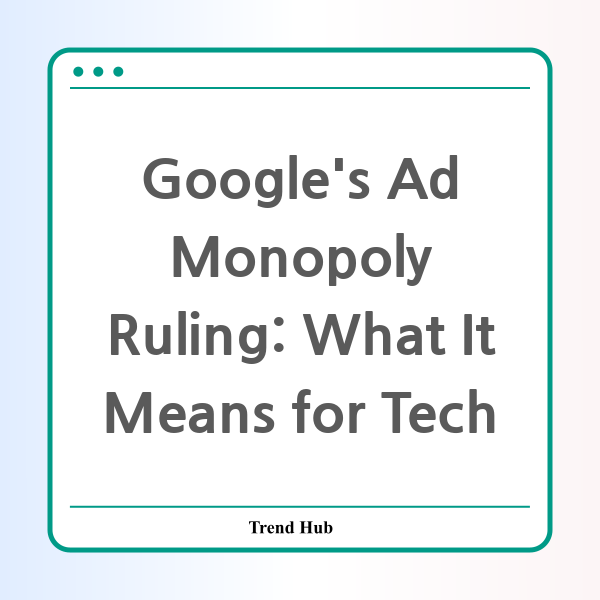* This website participates in the Amazon Affiliate Program and earns from qualifying purchases.

Is Google's monopoly on advertising about to crumble? Recently, a pivotal ruling has been issued regarding Google's control over online advertising technology, declaring it as illegally monopolizing the market. This significant judgment opens the door to a potential shift in the digital advertising landscape, paving the way for emerging competitors like OpenAI.
The courtroom drama surrounding Big Tech has been intensifying over the past few years, with Google now facing its most significant challenge in nearly three decades. As more attention is directed towards evaluating the power of tech giants, the focus on antitrust lawsuits gains momentum.
The ruling came after a judge meticulously examined Google's practices in the online advertising sphere. One of the most striking observations was the complete absence of any mention of OpenAI in the 115-page judgment. Yet, the impact of this legal battle undeniably favors OpenAI, the creator of ChatGPT, as it stands to benefit from Google's ongoing struggles.
The timing couldn’t be more critical. The rise of AI technologies is threatening the fundamental elements of Google's search-based business model. This ruling coincides with a time when the government is taking significant steps to hold tech companies accountable for their market dominance, akin to historical moments in tech history, such as IBM's legal battles in the 1970s and Microsoft's confrontation with antitrust regulations in the 1990s.
In those earlier instances, lengthy lawsuits provided an opportunity for new players to emerge and establish their market presence while established giants were occupied with legal defenses. With Google now embroiled in this legal framework, companies like OpenAI and Anthropic could find fertile ground to innovate and expand, potentially reshaping the tech ecosystem.
The repercussions of this ruling extend beyond just Google’s ad business. The tech giant is already dealing with the fallout from a prior decision related to its search market dominance. Potential fines and even remedies such as divestment from its Chrome browser loom large on the horizon.
This glacial court process may initially seem favorable for Google, allowing it to maintain the status quo while navigating the labyrinth of appeals. However, the continuous strain of litigation could distract and demoralize their workforce at a crucial time—one that could see competitors, backed by the advancements in AI, carving out their market share.
Google's current predicament is symptomatic of the broader issues that plague many tech giants. Simultaneously, companies like Meta are facing their own antitrust challenges, highlighting a growing trend in governmental scrutiny over the practices of digital enterprises.
Despite the uncertainty that looms, Google has taken steps to reassure its employees by emphasizing the parts of the lawsuit on which it found favorable outcomes. This approach helps bolster morale and encourages the company to remain focused on innovation even amid potential upheaval.
The overarching question remains—will Google manage to retain its dominance in the digital advertising arena, or will this legal scrutiny empower up-and-coming tech firms to disrupt the status quo? Only time will tell how these unfolding events will shape the future of the online advertising market and the tech industry at large.
As this situation evolves, it will be essential for all eyes to remain focused on the developments within the courtroom and beyond, as these decisions will influence technology, advertising practices, and market dynamics for years to come.
* This website participates in the Amazon Affiliate Program and earns from qualifying purchases.